Wegwijzer
Squad Project Pre-Master (DEP005)
Self-Reflection Tool / Didactic / Profile Choice / Higher Education

This project, although a roller coaster structure and communication-wise, proved to be a valuable growth experience. It challenged me, taught me valuable lessons, and revealed strengths and talents I hadn't fully recognized.
Year
2023
Expertise
User and Society
Business and Entrepreneurship
Creativity and Aesthetics
Math Data and Computing
Technology and Realization
Institution
Technical University Eindhoven
Team
Giovanni Sapienza
Fatima Kane
Reflection
This project served as an enlightening learning curve for me. Initially, my expectations created stress and pressure for me as our teamwork commenced. Upon assuming a management position within the group, I quickly realized the need to consider various project aspects beyond my initial expectations, for instance the team dynamics, and adapting to knew considerations into the design process, such as ERB and keeping track of sources and references.
Unfortunately, group dynamics proved less than ideal, leading to difficulties in understanding each other’s visions and ideas and resulting in tension among team members. Discussing this issue with my coach prompted the realization that fostering open communication was essential. Consequently, I implemented weekly group reflections to allow everyone to voice their fears and concerns. These sessions facilitated constructive criticism, improving collaboration with one teammate, but the concept did not resonate as well with the others.
At this point, the pivotal lesson was the significance of trust within a team. Our team struggled with fragile trust, leading to multiple fractures. Eventually, one teammate and I concluded that completing the project independently would be beneficial for our development, as the third teammate remained unreceptive. This experience underscored the importance of effective communication within a group, a skill I had previously taken for granted.
Reflecting on my communication style, I acknowledged the inadvertent imposition of stress and perfectionism on the group, placing undue pressure on my teammates. Eventually recognizing the distinction between perfectionism and attention to detail, I adjusted my expectations, learning that effective team management involves managing one’s own expectations, being fair, and embracing an open-minded approach to the concerns of others.
This project has been instrumental in my personal and professional development as a designer. It prompted self-reflection and unexpected growth, challenging me in ways I hadn’t anticipated. I am grateful for the challenges faced, as they revealed valuable learning points that are crucial beneficial for my learning journey as designer.
On a practical level, I addressed deficiencies in various expertise areas. First, I worked on building a richer process by learning how to implement value proposition, empathy maps, stakeholder mapping, benchmarking, and SWOT analysis, integrating these concepts throughout the project to maintain focus on our goals and deliverables. This helped me reinforce the business and entrepreneurship aspect of my process, as looking at this aspect helps to lay a foundation to formulate a concept that brings something new to the table. An improvement for future work involves revisiting the analysis mentioned before with each new iteration of a concept. The reason is that I have come to believe that every time there is a new iteration it is important to look back to see if the values and core characteristics that were defined at the beginning of the process still are relevant for the project, and if they are not reflect on what has changed and why.
Exploring business, entrepreneurship, and user-society expertise, I honed skills in contacting stakeholders and conducting interviews. Despite facing challenges in securing expert involvement, the positive response received later in the project was motivating. Engaging with a school, receiving feedback from its staff and attending events like the Night of the Nerds enhanced my ability to present projects effectively.
Collaborating with the school extended beyond the interview stage, as they invited us to test our tool with students. This experience taught me the importance of preparing for user tests, presenting concepts as works in progress, and gathering valuable feedback. It reinforced my commitment to implementing user testing in future projects.
In addressing deficiencies in Math, Data, Computing, and Technology and Realization, my teammate and I utilized Jupyter to implement data acquisition and visualization into our project. Creating a Proof-of-Concept prototype involved trial and error and helped me embrace the iterative process, resulting in more structured content.
Lastly, I further developed my creativity and aesthetics, leveraging my graphic design expertise to create an engaging and visually appealing concept. This experience made me contemplate how to integrate design skills with technology and learning development for mindful and aesthetically pleasing projects.
In conclusion, this project, although a roller coaster structure and communication-wise, proved to be a valuable growth experience. It challenged me, taught me valuable lessons, and revealed strengths and talents I hadn’t fully recognized. With the benefit of hindsight during the Christmas break, I am grateful for the entire experience and look forward to uncovering more impacts in the future.
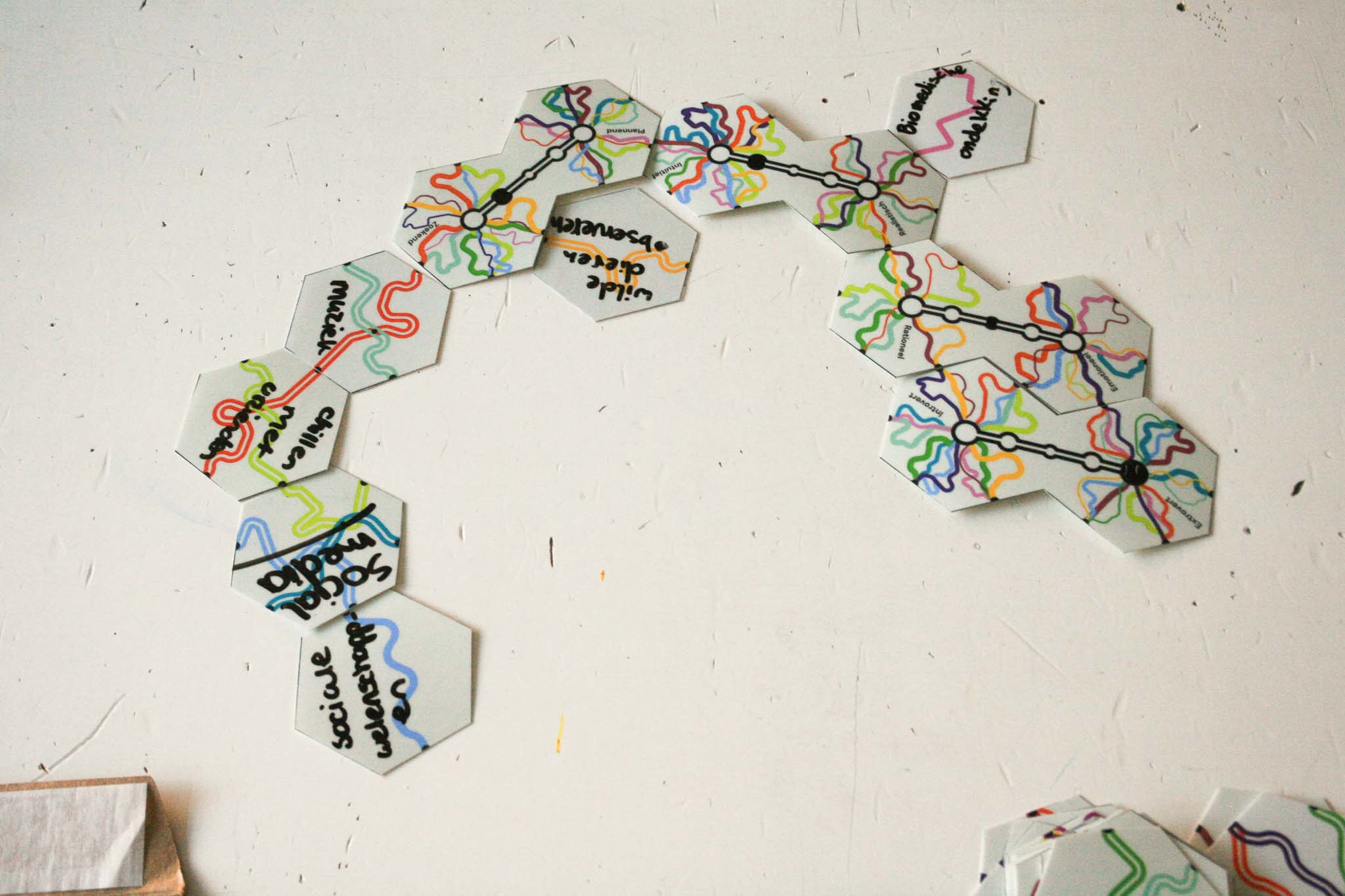
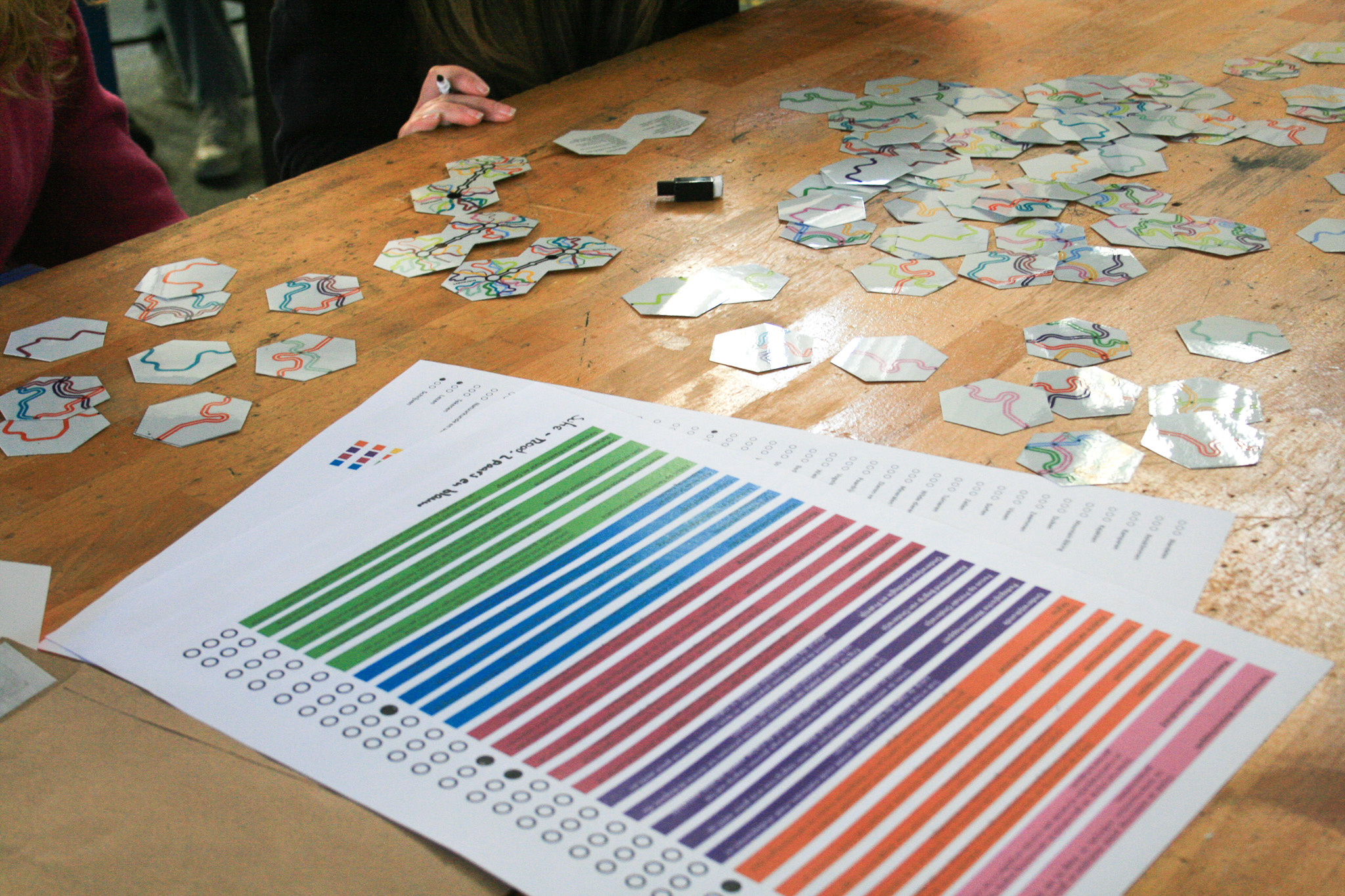
Wegwijzer
At the pivotal age of 14 and 15, students at Havo and VWO encounter the daunting task of selecting a subject package, known as a Profile, that will significantly impact their future educational and career paths. This decision becomes particularly challenging when students are still navigating their individual preferences and strengths, grappling with the larger question of what they truly enjoy and excel at. Acknowledging the overwhelming nature of these decisions for students in the early stages of self-discovery, we set out to create Wegwijzer, a comprehensive self-reflection tool designed to assist Havo and VWO 3 students in uncovering their unique characteristics.
Wegwijzer operates as both a self-reflection and conversational tool, embodying our belief that education is not solely about acquiring knowledge but also about embarking on a journey of self-discovery and personal development.
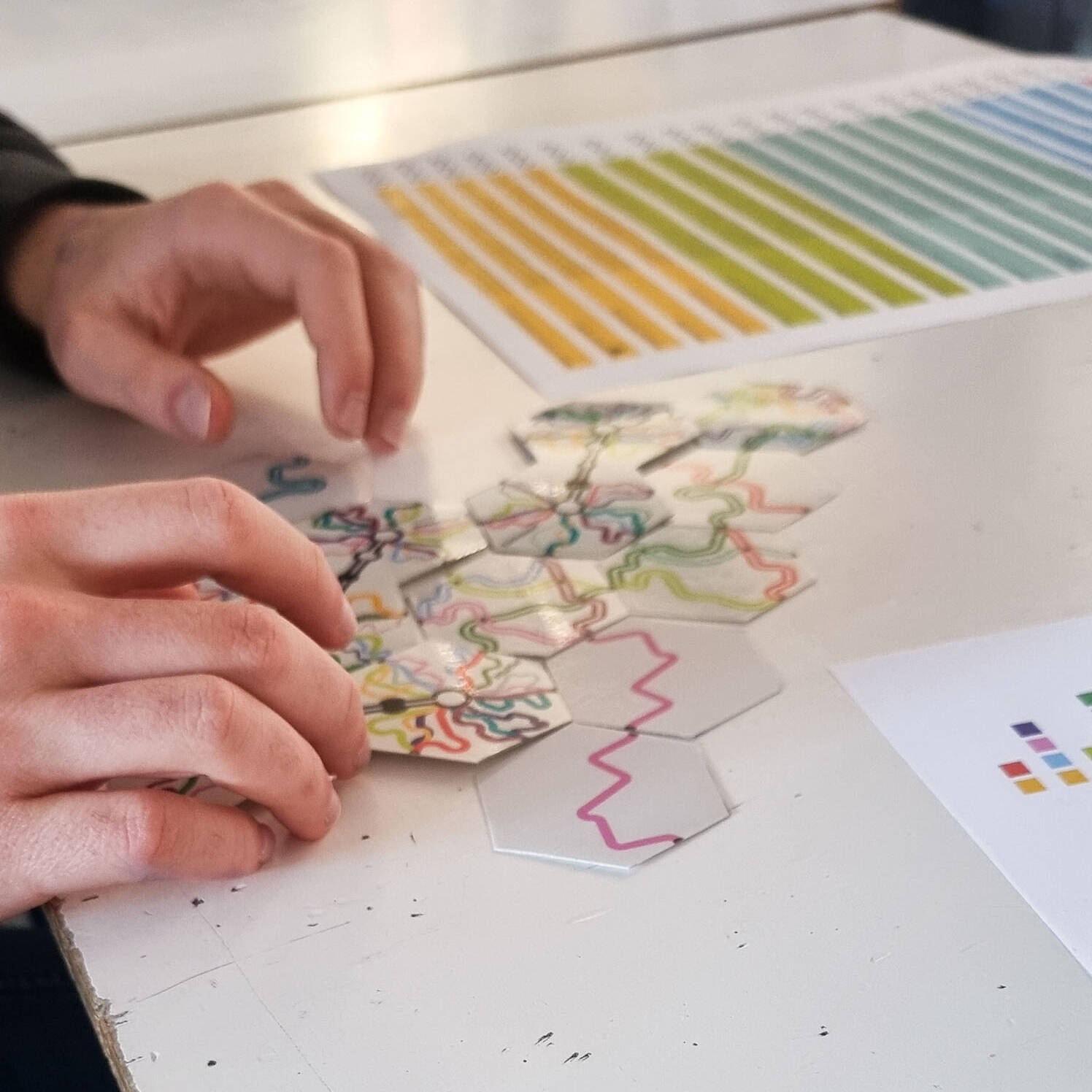
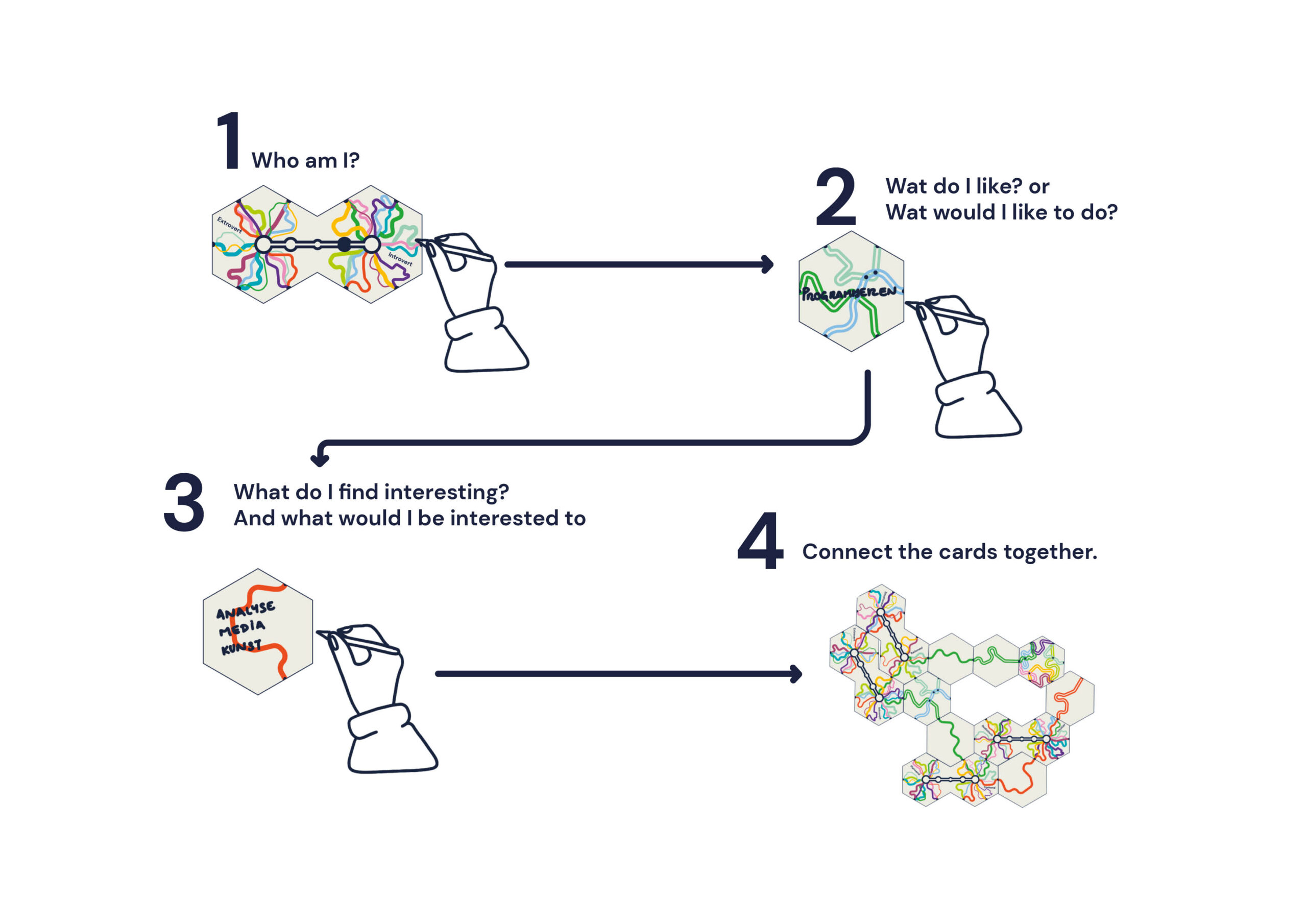
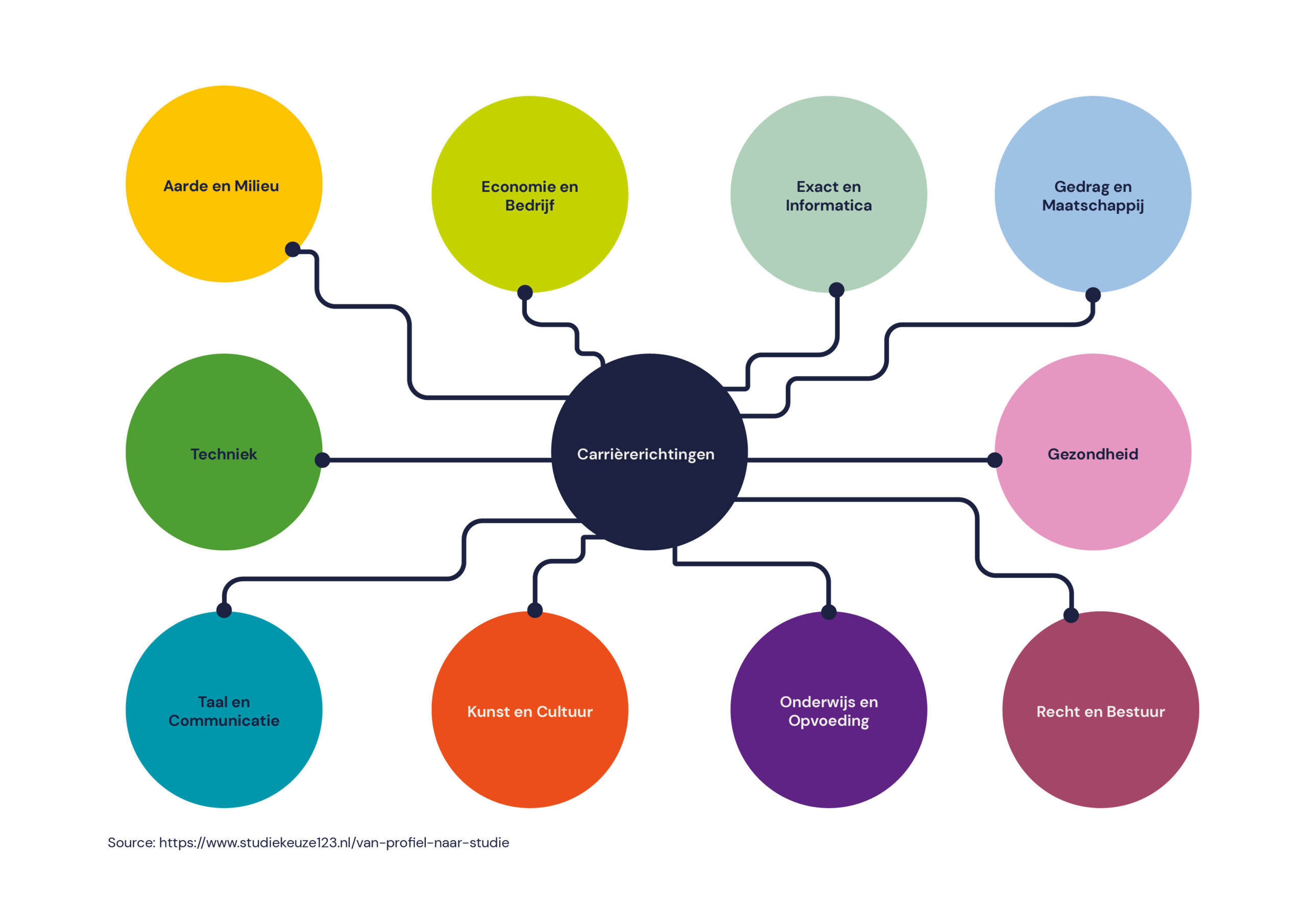
Our tool consists of three decks of cards, each addressing a specific aspect of self-reflection. The first deck, inspired by the Myers-Briggs Type Indicator (MBTI) model, prompts students to explore their personality characteristics, contemplating questions such as “Who am I?” and placing a pawn on a scale based on traits like introversion or extroversion, sensing or intuition, thinking or feeling, and judging or perceiving.
The second deck focuses on the question “What do I like?” Students select cards aligning with their preferences and place them alongside their personality cards. The third deck delves into “What do I find interesting?” and introduces themes related to potential career directions at the student’s level. The culmination involves the student connecting the selected cards to create a visual representation, emphasizing the prominence of specific colors, each linked to a career direction. This color-coded roadmap swiftly reveals connections between the reflection and potential career paths.
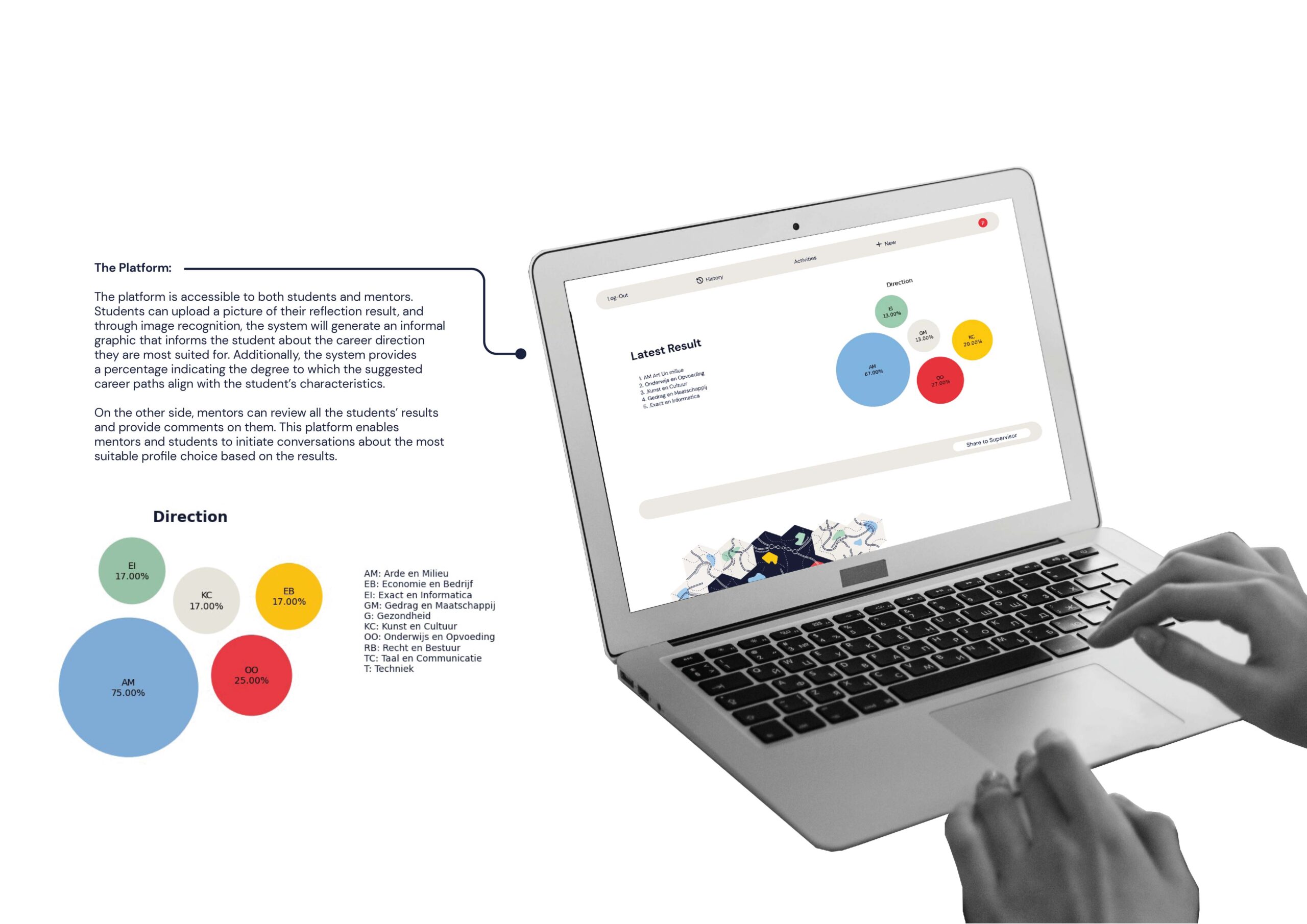
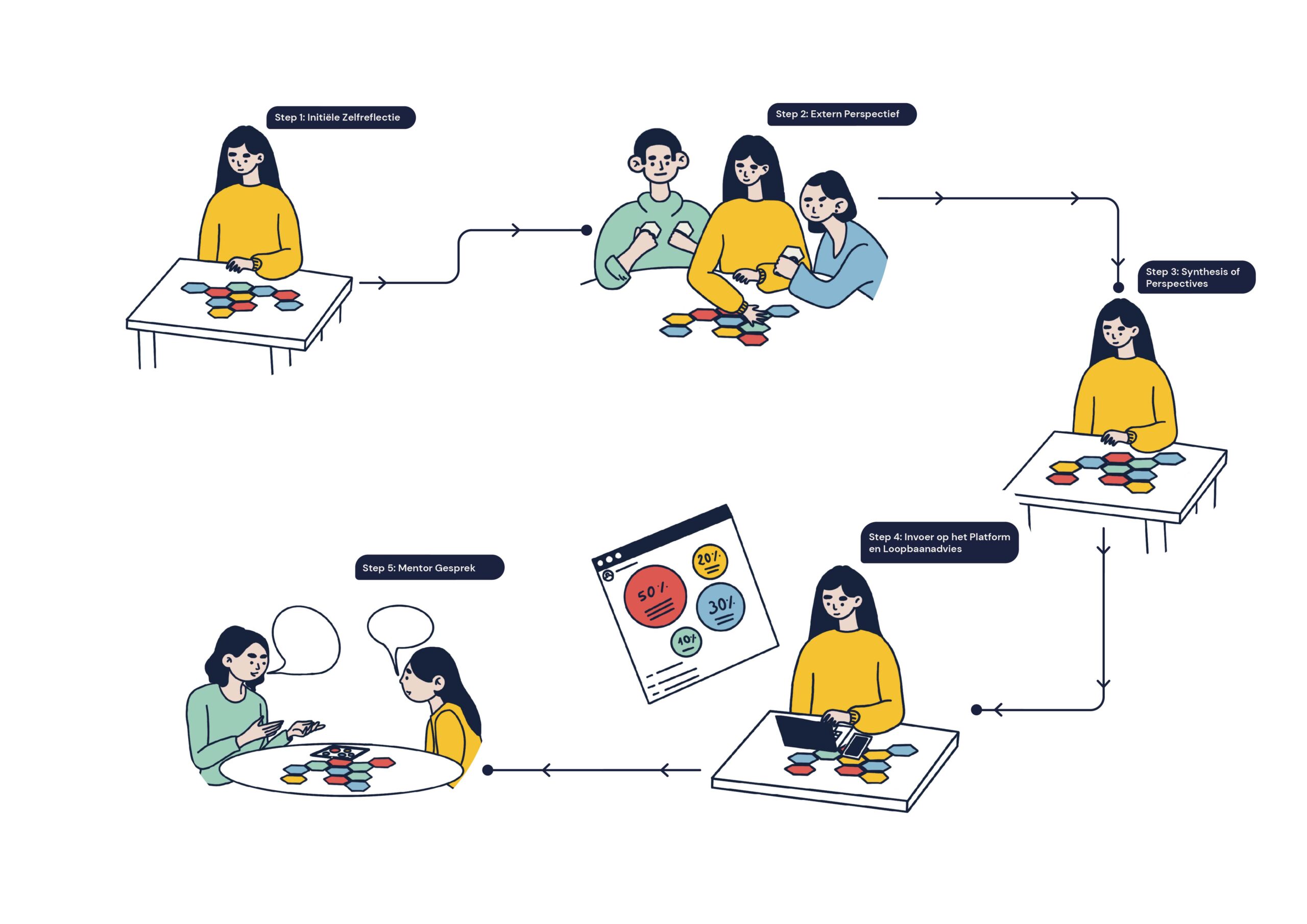
Building on the reflective process, the second phase involves simultaneous but independent reflections with another student. Collaborating with friends allows users to draw inspiration and seek assistance, striking a balance between individual contemplation and external input. Our user testing has validated the effectiveness of this approach, minimizing external influence on individual preferences.
The final reflection integrates insights from both the initial self-reflection and external perspectives. The results are then transmitted to a dedicated portal, generating a visualization illustrating career directions aligned with the student’s traits and preferences. This visualization serves as a conversational tool between mentors and students, facilitating discussions on profile choices and offering valuable guidance for the next steps in their educational journey.
Future Development
Throughout this project, I’ve come to realize that my passion lies in specializing my development in the creation of learning experiences and learning development design. This vision has been a guiding force throughout the project, prompting me to consistently consider its further development. Here are some potential future paths for this project:
- Complementary Tools: While the cards serve as a valuable component of the reflection process, there’s potential to design additional complementary tools. Exploring and creating tools that enhance the reflection experience could contribute to a more comprehensive and impactful learning journey.
- Gamification Enhancement: Introducing more gamification elements could make the reflection experience even more enjoyable. Incorporating game-like features could further engage users and add an element of fun to the learning process.
- Thorough Research on Card Content: Conducting more in-depth research on the words and content used in the cards is a necessary improvement. Both quantitative and qualitative research methods can be employed to better understand the connection between childhood activities and their influence on career paths. This research can enhance the effectiveness of the tool.
- Reconsideration of MBTI Model: It’s essential to reevaluate the choice of the MBTI model in the tool. Further research into alternative models or refining the use of the MBTI model should be considered to ensure the most effective and relevant personality assessment.
Beyond educational settings, there’s potential for the tool to be applied in various contexts. For instance, in business settings, it could be employed to facilitate reflections on company goals. Additionally, individuals seeking personal change or growth could utilize the tool to reflect on their own paths. This broader application showcases the versatility and potential impact of the tool beyond its initial educational focus.
In conclusion, the project has not only provided valuable insights into learning experience design but has also sparked ideas for its continued development and broader applications in diverse settings.

